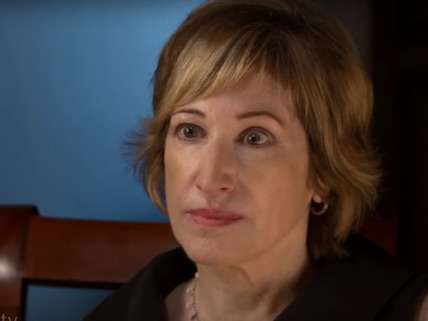Wellesley College Professors Say Offensive Speakers Like Laura Kipnis 'Harm' Students and Shouldn't Be Invited
"There is no doubt that the speakers in question impose on the liberty of students, staff, and faculty at Wellesley."

Six professors at Wellesley College sent an email to members of campus imploring the community not to invite controversial speakers who might upset certain students—speakers like Northwestern University Professor Laura Kipnis, the noted critic (and victim) of the Title IX bureaucracy.
The professors' statement is incredible. If their position was accepted by the college, it would demolish the entire foundation of higher education.
"There is no doubt that the speakers in question impose on the liberty of students, staff, and faculty at Wellesley," wrote the professors in their email.
To be clear, they are saying that extending a platform to any speaker whose ideas might be disliked by some member of the community is essentially a violation of the member's rights. Remedying this injustice requires not inviting such speakers and ignoring the rights of campus members who might actually like to hear a contrary perspective for once.
The professors go on to lament that the harms to students—"harm" being synonymous with offense in this instance—could have been avoided if only the people inviting controversial speakers had comprehended the likelihood of offense being given, and not moved forward with the invitation on that basis.
"The speakers who appeared on campus presented ideas that they had published, and those who hosted the speakers could certainly anticipate that these ideas would be painful to significant portions of the Wellesley community," wrote the professors. "Laura Kipnis's recent visit to Wellesley prompted students to respond to Kipnis's presentation with a video post on Facebook. Kipnis posted the video on her page, and professor Tom Cushman left a comment that publicly disparaged the students who produced the video. Professor Cushman apologized for his remarks, but in light of these developments, we recommend the following."
Before we move on to the recommendations, consider what these professors are doing: they are ceding total power to students who claim to be victimized by opinions they don't like. In their view, it is inappropriate for members of campus to invite a speaker whose views are not accepted by 100% of the student body. It is also inappropriate for a university professor to tell students that they are misguided about something.
If an institution of higher learning actually surrendered on these two issues, there would be no point to continue operating. There would be no point to having classes at all. Students would be paying for their own affirmation, rather than any kind of education.
The email continues:
First, those who invite speakers to campus should consider whether, in their zeal for promoting debate, they might, in fact, stifle productive debate by enabling the bullying of disempowered groups. We in CERE are happy to serve as a sounding board when hosts are considering inviting controversial speakers, to help sponsors think through the various implications of extending an invitation.
Second, standards of respect and rigor must remain paramount when considering whether a speaker is actually qualified for the platform granted by an invitation to Wellesley. In the case of an academic speaker, we ask that the Wellesley host not only consider whether the speaker holds credentials, but whether the presenter has standing in his/her/their discipline. This is not a matter of ideological bias. Pseudoscience suggesting that men are more naturally equipped to excel in STEM fields than women, for example, has no place at Wellesley. Similar arguments pertaining to race, ethnicity, sexuality, religion, and other identity markers are equally inappropriate.
Third, faculty and administrators should step up in defense of themselves and all members of the Wellesley community. The responsibility to defend the disempowered does not rest solely with students, and the injuries suffered by students, faculty, and staff are not contained within the specific identity group in question; they ripple throughout our community and prevent Wellesley from living out its mission.
Emphasis mine. It's amazing to watch the professors insist that they are not ideologically biased, and then proceed in the very next sentence to engage in bias against a specific ideological position—a position that I suspect is wrong, but is certainly worth discussing at a university campus if someone wishes to argue the opposite. As Harvard University psychology professor Steven Pinker once said about this very issue, "Perhaps the hypothesis is wrong, but how would we ever find out whether it is wrong if it is 'offensive' even to consider it?"
The professors who wrote this email—who wish to serve as gatekeepers of permissible discourse on campus, and urge the Wellesley community to self-censor in the name of emotional comfort— are Diego Arcineagas, Beth DeSombre, Brenna Greer, Soo Hong, Michael Jeffries, and Layli Maparyan. Their email was recently publicized by the Foundation for Individual Rights in Education, which strongly objected to its contents.
Kipnis objected, too. As she told FIRE:
"I find it absurd that six faculty members at Wellesley can call themselves defenders of free speech and also conflate my recent talk with bullying the disempowered," Kipnis told FIRE in an email. "What actually happened was that there was a lively back and forth after I spoke. The students were smart and articulate, including those who disagreed with me."
"I'm going to go further and say — as someone who's been teaching for a long time, and wants to see my students able to function in the world post-graduation — that protecting students from the 'distress' of someone's ideas isn't education, it's a $67,000 babysitting bill."
If the faculty will not re-assert that the purpose of a liberal arts education is to actually teach students Enlightenment liberal principles—including the paramount value of unfettered free speech—the campus free expression wars are truly lost. Given this email, and given the behavior of so many faculty members at Middlebury College, it is difficult not to be pessimistic about the fure of freedom on campus.


Show Comments (149)